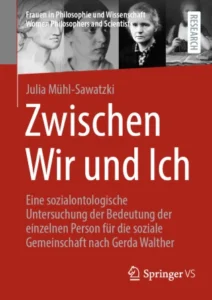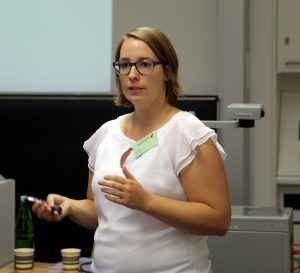 In June 2025, the volume Between We and I (Zwischen Wir und Ich) by Julia Mühl-Sawatzki was published by Springer as part of the book series Women in Philosophy and Science. The work emerged from her doctoral research at Paderborn University and is dedicated to the social-ontological conception of the early phenomenologist Gerda Walther (1897–1977).
In June 2025, the volume Between We and I (Zwischen Wir und Ich) by Julia Mühl-Sawatzki was published by Springer as part of the book series Women in Philosophy and Science. The work emerged from her doctoral research at Paderborn University and is dedicated to the social-ontological conception of the early phenomenologist Gerda Walther (1897–1977).
At the heart of the book lies an in-depth examination of Walther’s early writings. The study is guided by three central questions:
a) What is the social-ontological relationship between the individual and the community according to Walther?
b) Can this individual act freely within the social community?
c) How can Walther’s philosophical position be classified?
The challenge of answering these questions lies in the tension between historical materialism and phenomenological subjectivism that Walther navigates. Julia Mühl-Sawatzki argues that Walther develops an anti-singularist approach to the social-ontological relation between the individual and the community. The implications of this approach for the concept of free will within the social context, as well as Walther’s broader philosophical positioning, are systematically elaborated in this study.

Julia Mühl-Sawatzki was a research associate at the Center for the History of Women Philosophers and Scientists from 2015 to 2020, and from 2018 onward she coordinated the project Women in Early Phenomenology. Alongside her research, she contributed significantly to the digital dissemination of philosophical content—through online teaching formats and through the development of a digital timeline on the lives of Edith Stein, Hedwig Conrad-Martius, and Gerda Walther. Her video introductions to the phenomenological movement and to the philosophy of Gerda Walther are available via the Center’s YouTube channel. Most recently, she co-led a BSP online course on Women in Early Phenomenology together with Daniel Neumann.
You cannot copy content of this page








